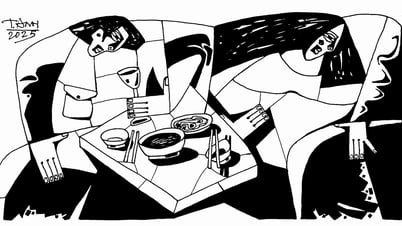Durian contains nutrients such as fiber, potassium, vitamin C and folate, rich in antioxidants, anti-inflammatory compounds, which are good for overall health and fight disease.
Durian - a storehouse of many nutrients
Amazingly, just one cup of durian can provide most of the nutrients your body needs. It contains more calories, fat, fiber, and carbohydrates than most other fruits, according to the health news site Health .
Durian provides many nutrients that the body needs, Photo: AI
One cup of durian provides 9.23 grams of fiber, which is nearly 33% of the daily fiber requirement. Durian provides both soluble and insoluble fiber, which helps promote regular and comfortable bowel movements, promotes the growth of beneficial bacteria in the digestive tract, and protects heart health by regulating cholesterol levels.
Durian is also rich in vitamins and minerals. One cup of durian provides 53% of the daily vitamin C requirement, 23% of the potassium requirement, 22% of the folate requirement, 45% of the vitamin B6 requirement, 16% of the vitamin B3 requirement, and 17% of the magnesium requirement, among many other nutrients that play an important role in health.
Vitamin B6 is needed for red blood cell production, amino acid metabolism, and neurotransmitter synthesis.
Vitamin C has powerful antioxidant properties and is needed for collagen production and immune function.
Magnesium is an essential mineral for healthy blood pressure regulation.
Potassium and magnesium support heart health by reducing the risk of high blood pressure.
With such an impressive nutrient profile, durian offers many health benefits.
Fight heart disease, cancer and prolong life
Research has found that the fiber in durian may protect against cardiovascular disease. In particular, the fat in durian is monounsaturated fat - which is considered "heart-healthy" because it helps regulate cholesterol levels, which can reduce the risk of heart disease.
The magnesium and potassium in durian help control blood pressure. It is also a good source of folate, which helps regulate homocysteine levels, thereby reducing inflammation, atherosclerosis, and the risk of heart disease.
Vitamin C in durian has strong antioxidant properties that promote immune function, Photo: AI
The vitamin C in durian has powerful antioxidant properties that boost immune function. Studies show that diets rich in vitamin C can help fight a number of health conditions, including certain types of cancer and heart disease.
The rich source of phytonutrients in the "king of fruits", such as flavonoids and carotenoids, helps protect cells from oxidative damage, thereby preventing heart disease and certain types of cancer.
High flavonoid intake also helps reduce the risk of death from all causes, including death from heart disease, according to Health.
May support brain health
The vitamin C in durian may support brain health. Research suggests that consuming more vitamin C may benefit the brain. A study of 80 older adults found that those with higher blood levels of vitamin C performed better on tasks involving concentration, memory, attention, decision-making, and recognition.
The flavonoids in durian also help reduce cognitive decline and Alzheimer's disease.
Who should limit eating durian?
Durian is safe for most people. However, people with the following health conditions should be extra careful when eating durian.
People with chronic kidney disease. A cup of durian provides 1,060 mg of potassium - equivalent to 23% of daily needs. Therefore, people with chronic kidney disease, who must control their potassium intake, should limit consumption.
Diabetics. Durian is rich in carbohydrates. Diabetics and people on low-carb diets should avoid or eat durian in small amounts.
Additionally, durian is rich in fiber, which can cause digestive side effects such as gas, bloating, and diarrhea in people who are not used to fiber-rich foods.
Source: https://thanhnien.vn/dieu-gi-bien-sau-rieng-thanh-vua-cua-cac-loai-trai-cay-185250507212329682.htm





![[Photo] More than 17,000 candidates participate in the 2025 SPT Competency Assessment Test of Hanoi National University of Education](https://vphoto.vietnam.vn/thumb/1200x675/vietnam/resource/IMAGE/2025/5/17/e538d9a1636c407cbb211b314e6303fd)
![[Photo] National conference to disseminate and implement Resolution No. 66-NQ/TW and Resolution No. 68-NQ/TW of the Politburo](https://vphoto.vietnam.vn/thumb/1200x675/vietnam/resource/IMAGE/2025/5/18/adf666b9303a4213998b395b05234b6a)
![[Photo] Prime Minister Pham Minh Chinh chairs meeting on science and technology development](https://vphoto.vietnam.vn/thumb/1200x675/vietnam/resource/IMAGE/2025/5/17/ae80dd74c384439789b12013c738a045)






















![[Photo] Readers line up to visit the photo exhibition and receive a special publication commemorating the 135th birthday of President Ho Chi Minh at Nhan Dan Newspaper](https://vphoto.vietnam.vn/thumb/1200x675/vietnam/resource/IMAGE/2025/5/17/85b3197fc6bd43e6a9ee4db15101005b)



























































Comment (0)